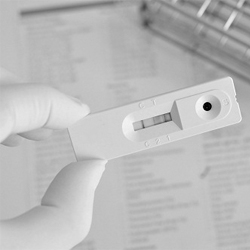TruQuick™ Transferrin/FOB Combo
Colorectal cancer is cancer that occurs in the colon or rectum, and affects both men and women of all racial and ethnic groups, and is most often found in people aged 50 years or older. For men, colorectal cancer is the third most common cancer after prostate and lung cancers. For women, colorectal cancer is the third most common cancer after breast and lung cancers. Fecal occult blood should be an important indicator in the diagnostic evaluation of patients with suspected gastrointestinal bleeding of any etiology, not just as an indication of colorectal cancer. The presence of human hemoglobin in feces is inadequate as a screening test for stomach cancer (upper gastrointestinal disorders), because of human hemoglobin derived from the upper digestive tract is broken down in the intestinal tract (the antigenicity is lost). Detection of fecal transferrin, which is more stable in stool than hemoglobin, provides an alternative way of diagnosing the disease in the upper digestive tract. Blood in the stool may be the only symptom of cancer, but not all blood in the stool is caused by cancer. Other conditions that can cause blood in the stool include: Haemorrhoids, Anal fissures, Colon polyps, Peptic ulcers, Ulcerative colitis. Gastroesophageal reflux disease (GERD). Crohn’s disease, use of non-steroidal anti-inflammatory drugs (NSAIDs).
- WALKER C.W., “Fecal occult blood tests reduce colorectal cancer mortality.”, Am Fam Physician. 2007 Jun 1;75(11):1652-3.
- CHIEN-HUA CHIANG, et al. «A comparative study of three fecal occult blood tests in upper gastrointestinal bleeding»; Kaohsiung J. Med. Sci May 2006, Vol 22, No 5: 223-228
- HIROFUMI MIYOSHI, et al. «Accuracy of Detection of Colorectal Neoplasia using an Immunochemical Occult Blood Test in Symptomatic Referred Patients: Comparison of Retrospective and Prospective Studies. Internal Medicine Sept. 2000 Vol. 39, No. 9: 701-706

